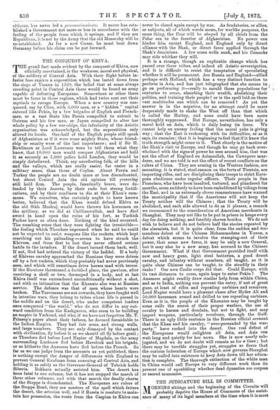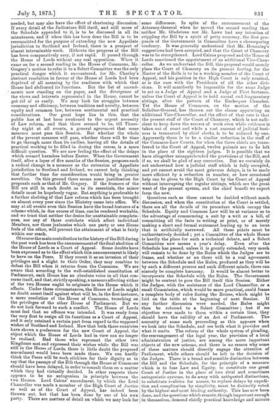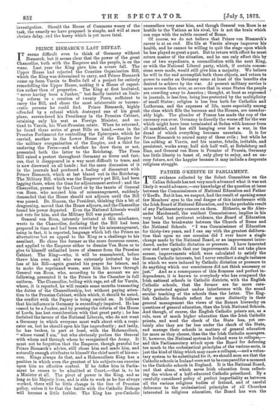THE .TUDICATURE BILL IN COMMITTEE.
UORNING sittings and the beginning of the Circuits will I/1 probably deprive the House of Commons of the assist- ance of many of its legal members at the time when it is most
needed, but may also have the effect of shortening discussion. If every detail of, the Judicature Bill itself, and still more of the Schedule appended to it, is to be discussed in all its minuteness, and if when this has been done the Bill is to be recommitted for the purpose of extending the new Appellate jurisdiction to Scotland and Ireland, there is a prospect of almost interminable work. Hitherto the progress of the Bill has been comparatively easy, if not rapid. It passed through the House of Lords without any real opposition. When it came on for a second reading in the House of Commons, Mr. Gregory's motion to refer it to a Select Committee was the only practical danger which it encountered, for Mr. Charley's abstract resolution in favour of the House of Lords had been deprived of all meaning by the readiness with which that House had abdicated its functions. But the list of amend- ments now standing on the paper, and the divergence of
' the views and interests represented in the House, cannot be got rid of so easily. We may look for struggles between economy and efficiency, between tradition and novelty, between equity and common law, between sentimental and practical considerations. Our great hope lies in this, that the public has at last been awakened to the urgent necessity of Law reform, and that there seemed to be, till Thurs- day night at all events, a, general agreement that some measure must pass this Session. But whether the whole of the present measure will pass, whether there will be time to go through more than its outline, leaving all the details of practical working to be filled in during the recess, is a more difficult question. We are now feeling the effect of the delays which seemed harmless before Easter. When the Government itself, after a lapse of five months of the Session, proposes such a radical change in a measure as the extension of Appellate jurisdiction to Scotland and Ireland, we cannot help thinking that further time for consideration would bring in greater novelties. On this ground there seems some justification for proposals such as that of Mr. Gregory. If the framers of the Bill are still in such doubt as to its essentials, the minor details must be hopelessly vague. But anything is preferable to a further shelving of that Law reform which has been brought on almost every year since the Ministry came into office. We may at all events even this Session have the broad features of a scheme which, in due course of time, can be rendered workable, and we trust that neither the desire for unattainable complete- ness, nor any of those crotchets which affect individual Members, nor those jealousies which one party or one House feels of the other, will prevent the attainment of what is fairly within our reach.
Of course the main contribution to the history of the Bill during the past week has been the announcementof the final abolition of the House of Lords as a Court of Appeal. Some doubts have been expressed as to the effect which this announcement is likely to have on the Peers. If they resent it as an invasion of their privileges and a slight to their Order, they may combine to defeat the Bill when it returns from the Commons. We are aware that according to the well-established constitution of Parliament, each House has an absolute voice in all that con- cerns itself, and that, strictly speaking, a measure affecting either of the two Houses ought to originate in the House which it affects. Under these circumstances, the House of Lords might no doubt assert itself against what will be, in the first instance, a mere resolution of the House of Commons, trenching on the privileges of the other House of Parliament. But we do not look forward to such a conflict. The House of Lords must feel that no offence was intended. It was ready from the very first to resign all its functions as a Court of Appeal, and it only retained a certain part from regard to the supposed wishes of Scotland and Ireland. Now that both those countries have shown a preference for the new Court of Appeal, the object which the House of Lords had in view can no longer be realised. Had those who represent the other two Kingdoms met and expressed their wishes while the Bill was still in the House of Lords, there is little doubt the proposed amendment would have been made there. We can hardly think the Peers will be such sticklers for their dignity as to say that the passage of the Bill through the House of Commons should have been delayed, in order to consult them on a matter which they had virtually decided. In other respects there appears to be no antagonism in principle between the two Houses. Lord Cairns' amendment, by which the Lord Chancellor was made a member of Ow High Court of Justice as well as of the Court of Appeal, has indeed been thrown oat, but that has been done by one of his own party. There are matters of detail on which we may look for
some difference. In spite of the announcement of the Attorney-General when he moved the second reading that neither Mr. Gladstone nor Mr. Lowe had any intention of crippling the Bill by a spirit of petty economy, the first pro- posals of the Government in Committee have a cheeseparing tendency. It was generally understood that Mr. Hemming's suggestions had been accepted, and that the Court of Chancery was to be strengthened. Lord Cairns proposed and the House of Lords sanctioned the appointment of an additional Vice-Chan- cellor. As we understand the Bill, this proposal would merely place the Court of Chancery on its present footing, for the Master of the Rolls is to be a working member of the Court of Appeal, and his position in the High Court is only nominal, as is the case with the Presidents of all the other divi- sions. It will manifestly be impossible for the same Judge to act as a Judge of Appeal .and a Judge of First Instance, unless the Court of Appeal is to hold casual and fragmentary sittings, after the pattern of the Exchequer Chamber. Yet the House of Commons, on the motion of the Solicitor-General, has thrown out the clause appointing an additional Vice-Chancellor, and the effect of that vote is that the present staff of the Court of Chancery, which is not suffi- cient to keep down the arrears of work even while evidence is taken out of court and while a vast amount of judicial busi- ness is transacted by chief clerks, is to be reduced by one. Apparently there is to be a similar reduction in the staff of the Common-Law Courts, for when the three chiefs are.trans- ferred to the Court of Appeal, twelve puisnes are to be left in the place of the eighteen judges. It. is possible that we have altogether misapprehended the provisions of the Bill, and if so, we shall be glad of any correction. But we certainly do, not understand how a judicial staff which is fully occupied, and yet cannot avoid the most grievous delays, is to be made more efficient by a reduction in number, or how occasional help can be given to the High Court by the Court of Appeal without interrupting the regular sittings, which are the great want of the present system, and the chief benefit we expect from the new.
Questions such as these cannot be decided without much discussion, and when the constitution of the Court is settled, there are all the details of its procedure which occupy the Schedule. Equity and Common Law will be at variance as to the advantage of commencing a suit by a writ or a bill, of committing all the facts to writing or print, or of merely making a short and formal statement leading up to an issue-
that is artificially narrowed. All these points must be- authoritatively decided ; yet a Committee of the whole House- is hardly the place for such a technical debate, and a Select- Committee now means a year's delay. Even after the- Schedule has passed, unless it is greatly extended, very much will reriaain to be done by the Rules which the Judges are to. frame, and whether or no there will be a real agreement between the Schedule and the Rules, produced as they will ba- by such a different process and such different minds, there can scarcely be complete harmony. It would be almost better to incorporate the Schedule with the Rules. The Government might be content to pass the Bill itself this Session. Either the Judges, with the assistance of the Lord Chancellor, or a small Commission, which would be more practical, could frame a complete body of rules during the Recess, which might be laid on the table at the beginning of next Session. If any further discussion were needed, the Rules might then be referred to a Select Committee ; but if no objection were made to them within a certain time, they should have the validity of an Act of Parliament. The- necessity of some such proceeding as this appears when we look into the Schedule, and see both what it provides and what it omits. The reform of the whole system of pleading, the rearrangement of the legal year, the provision of a local administration of justice, are among the more important objects of the new scheme, and there is no reason why some of these matters should directly engage the attention of Parliament, while others should be left to the decision of the Judges. There is a broad and sensible distinction between the Bill and the Schedule, for the principle of a measure which is to fuse Law and Equity, to constitute one great Court of Justice in the place of two rival and sometimes antagonistic systems, to do away with antiquated distinctions, to substitute realities for names, to replace delays by expedi- tion and complication by simplicity, must be distinctly voted by the highest and most binding authority. This has now been done, and the questions which remain, though important enough in themselves, demand chiefly practical knowledge and minute investigation. Should the House of Commons weary of the task, the remedy we have proposed is simple, and will at once obviate delay, and the hurry which is yet more fatal.




































 Previous page
Previous page